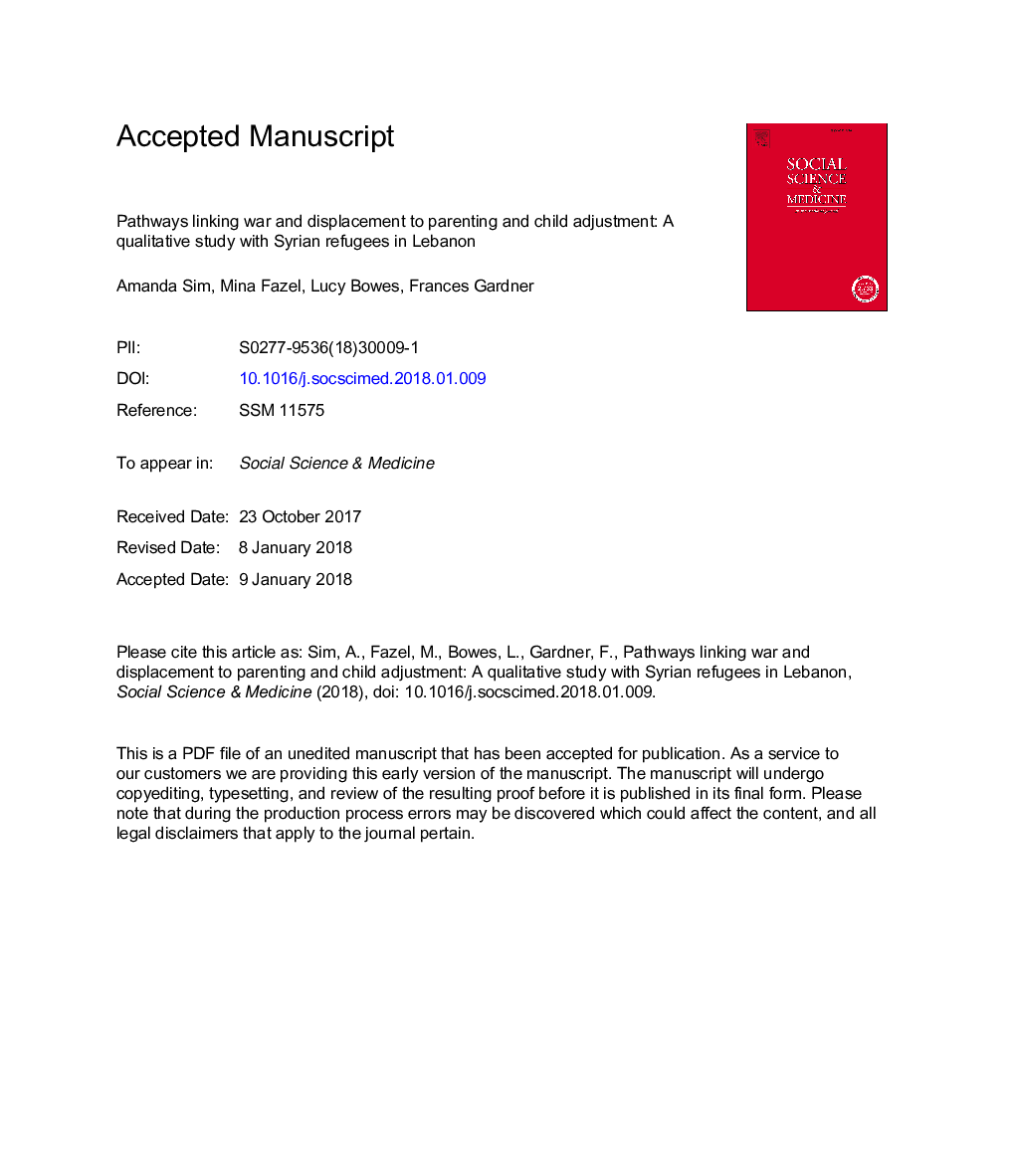| کد مقاله | کد نشریه | سال انتشار | مقاله انگلیسی | نسخه تمام متن |
|---|---|---|---|---|
| 7328315 | 1475969 | 2018 | 36 صفحه PDF | دانلود رایگان |
عنوان انگلیسی مقاله ISI
Pathways linking war and displacement to parenting and child adjustment: A qualitative study with Syrian refugees in Lebanon
ترجمه فارسی عنوان
راه های ارتباط جنگ و جابجایی به تنظیم والدین و فرزندان: یک مطالعه کیفی با پناهجویان سوری در لبنان
دانلود مقاله + سفارش ترجمه
دانلود مقاله ISI انگلیسی
رایگان برای ایرانیان
کلمات کلیدی
لبنان، پناهندگان سوری، جنگ، جابه جایی، عوامل روزانه، سلامت روان، والدین، تعدیل کودک،
ترجمه چکیده
کودکان آواره شده در معرض خطر طیف وسیعی از پیامدهای منفی هستند، اما در مورد چگونگی حمایت از مراقبین مراقبتی از جنگ در ارتقای قابلیت انعطاف پذیری روانشناختی کودکان شناخته شده نیست. مطالعه حاضر با استفاده از روش های کیفی برای بررسی مکانیزم هایی که اثرات جنگ و جابجایی را بر فرزندپروری و تعدیل فرزندان به منظور اطلاع دادن به توسعه مداخله ای مورد بررسی قرار می دهد. در ماه آوریل و نوامبر 2016، مصاحبه های گروهی و فردی با 39 والدین سوری و 15 کودک در همکاری با یک سازمان بشردوستانه در لبنان انجام شد. مصاحبه ها با استفاده از رویکرد تئوری پایه رونویسی و تحلیل شد. نتایج نشان می دهد که سه مسیر درونی مرتبط با تنشزدایی جابجایی روزانه به ابعاد مختلف والدین: (1) سختی های اقتصادی از والدین جلوگیری می کند تا نیازهای اساسی فرزندان خود را برآورده کنند و نیروهای انطباقی را که مانع تعاملات والدین و فرزندان مثبت شود؛ (2) اختلال روانشناختی والدین به والدین سخت می انجامد؛ و (3) ادراکات و تجربیات ناامنی در جامعه موجب افزایش کنترل والدین می شود. منابع اقتصادی بزرگ و حمایت اجتماعی به عنوان عوامل حفاظت کننده بالقوه برای حفظ والدین مثبت، علی رغم مواجهه با ناسازگاری جنگی و جابجایی، ظهور کردند. یافته های ما نشان می دهد که پیاده سازی سیاست ها و برنامه های برای حذف موانع ساختاری برای امنیت فیزیکی و اقتصادی پناهندگان می تواند تاثیرات ملموس بر سلامت روان والدین، کیفیت والدین و پیامدهای روانی اجتماعی کودک داشته باشد. اولویت های تحقیق در آینده شامل تمرکز قوی بر تأثیرات جنگ و جابجایی در فرایندهای خانوادگی، با توجه به تعاملات با زمینه های اجتماعی، اقتصادی و سیاسی گسترده تر است.
موضوعات مرتبط
علوم پزشکی و سلامت
پزشکی و دندانپزشکی
سیاست های بهداشت و سلامت عمومی
چکیده انگلیسی
Forcibly displaced children are at risk of a range of negative outcomes, yet little is known about how to support war-affected caregivers in promoting children's psychosocial resilience. The current study uses qualitative methods to examine the mechanisms underlying the effects of war and displacement on parenting and child adjustment in order to inform intervention development. In April and November 2016, group and individual interviews were conducted with 39 Syrian parents and 15 children in partnership with a humanitarian organization in Lebanon. Interviews were transcribed and analyzed using a grounded theory approach. Results show three interrelated pathways linking daily displacement stressors to various dimensions of parenting: (1) economic hardship prevents parents from meeting their children's basic needs and forces adaptation strategies that impair positive parent-child interactions; (2) parental psychological distress contributes to harsh parenting; and (3) perceptions and experiences of insecurity in the community results in increased parental control. Greater economic resources and social support emerged as potential protective factors for maintaining positive parenting despite exposure to war and displacement-related adversity. Our findings suggest that implementation of policies and programs to remove structural barriers to refugees' physical and economic security can have tangible impacts on parental mental health, parenting quality, and child psychosocial outcomes. Future research priorities include a stronger focus on the effects of war and displacement on family processes, taking into account interactions with the broader social, economic and political context.
ناشر
Database: Elsevier - ScienceDirect (ساینس دایرکت)
Journal: Social Science & Medicine - Volume 200, March 2018, Pages 19-26
Journal: Social Science & Medicine - Volume 200, March 2018, Pages 19-26
نویسندگان
Amanda Sim, Mina Fazel, Lucy Bowes, Frances Gardner,
